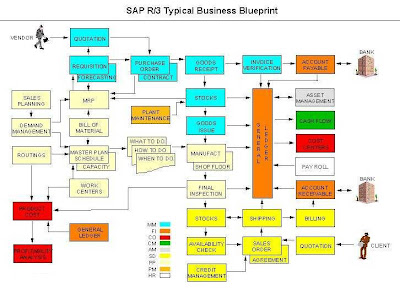
SAP Materials Management
•Materials Management
ØOrganization Levels
ØMaterial Masters
ØVendor Master
ØInfo Records
ØPurchasing
ØMaterial Movements
ØMaterial documents
ØStock Types
ØLogistics Invoice Verification
•
•Organization Levels
ØClient
•A Client is a self-contained unit in an R/3 System. In other words a client is a corporate group.
•General material data applicable to the entire company is stored at client level. I.e, Material group, Base unit of measure, Material descriptions, Conversion factors for alternative units of measure, etc.
ØCompany Code
•Smallest organizational unit for which a complete self-contained set of accounts can be drawn up for purposes of external reporting. I.e, Balance sheet & Profit-Loss account.
ØPlant
•Plant is an organizational unit which subdivides a enterprise based on its functioning. I.e, According to production, procurement, maintenance, and materials planning aspects.
•Plant is a place where either materials are produced or goods and services provided.
•Inventory Valuation is always done at Plant level.
•Plants are assigned to Business area in Financial Accounting.
•Purchasing Groups are subsets of a Purchase Organization which are responsible for purchases of specific purchases I.e, Raw Materials, Spares, etc.
The SAP R/3 Procurement business process uses the following R/3 organizational elements:
uCompany code
uPlant
uStorage location
uPurchasing organization
uPurchasing group
•A plant is an organizational unit within a company. A plant produces goods, renders services or makes goods available for distribution.
•A plant can be one of the following types of locations:
uManufacturing facility
uWarehouse distribution centre
uRegional sales office
uCorporate headquarters
Storage locations are organizational units that allow the differentiation of material stocks within a plant.
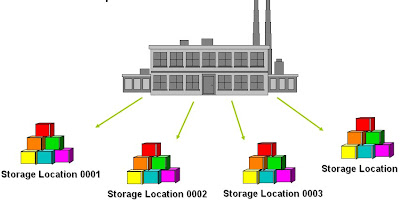
Purchasing Organizations and Plants
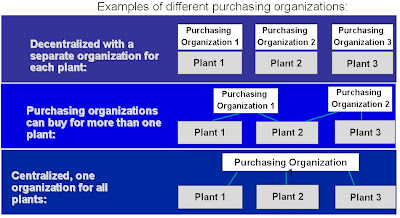
Important master data in the Procurement process includes:
uMaterial Master
uVendor Master
uPurchasing Information Records
ØMaterial master contains information on all the materials that a company procures, produces, stores, and sells.
ØIt is the company's central source for retrieving material-specific data. This information is stored in individual material master records.
ØEach material is given a unique material no. This number may be given by the system or keyed in by the user as per decision of the company.
ØIndustry types are like Chemical Industry, Mechanical Engineering, Pharmaceuticals, Media Industry, etc.
ØMaterial types can be like, Raw materials (ROH), Finished goods (FERT), Packing materials (VERP), Spares (ERSA), etc.
ØThe Material type & Industry sector together decide what screen fields are to be displayed for a material.
ØThe screen fields are stored in various views in a material master. I.e, Basic data 1 & 2, Purchasing, Sales, MRP, General Plant data 1 & 2, Accounting, etc.
ØEach of the views contains specific information, I.e, Basic Data 1 contains information on Material Description, Units of Measure, etc. Accounting contains information like Price Control, Valuation Control, Standard Price, Unit Price, etc.
•The material master contains all data required to define and manage material. It integrates data from engineering, manufacturing, sales and distribution, purchasing, accounting, and other departments.
•The material master is used as a source of data for purchase order processing throughout the procurement cycle.
General data
Purchasing data
Accounting data
Sales data
Manufacturing data
•
The material master contains information about the materials an enterprise buys, produces, stores, and sells
•
Information is stored in a database that is used as a central repository for material data
•
Material data is used throughout the R/3 System. Applications related to Procurement include:
u
Purchasing
u
Inventory Management
u
Invoice Verification
u
MRP
Material Master Data
•Material types group materials with the same basic attributes.
•Material type information determines:
uWhich departmental views are maintained.
uWhether changes in material quantities are updated.
uWhether internal or external procurement is allowed.
uWhich general ledger accounts are updated (e.g., inventory account).

Organizational Levels
•Material master information is organized hierarchically according to organizational level. Levels affecting materials management include:
uClient
uPlant
uStorage Location
•Organizing materials hierarchically allows easy management of information across an enterprise and prevents redundant storage of material data
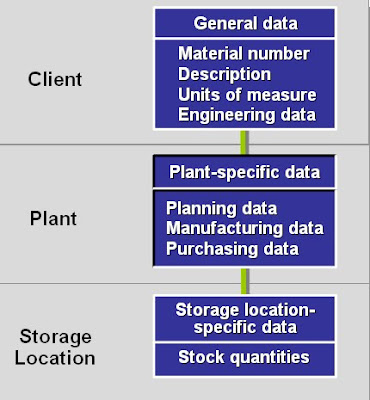
Material Master Primary Views
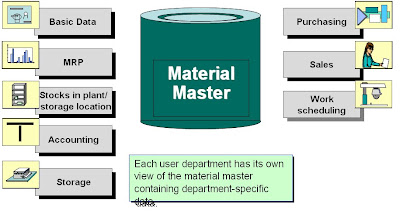
View Selection Screen
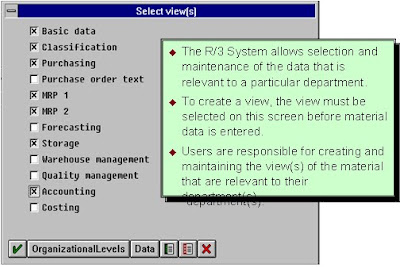
Valuation Area

General Concepts
•Material valuation determines and records the
value of stock material.
value of stock material.
•Unit price, stock quantity and total value are maintained in the material master.
•Valuation:
uLinks Materials Management with Financial Accounting by updating the General Ledger
uOccurs automatically whenever a goods movement
transaction (quantity change) or invoice is posted
transaction (quantity change) or invoice is posted
uCan be performed manually by:
lChanging standard or moving average prices
lPosting subsequent debits and credits in invoice verification
Processes Affecting Valuation

•Materials are valuated using two types of price control:
uStandard price
uMoving average price
•Standard price requires that all postings be carried out at one price for a set period of time. All variances are posted to price difference accounts.
•Moving average price requires that materials be valuated at goods receipt value. Moving average prices are automatically adjusted in the material master when variances occur.
•Price control should be set in the material master (accounting view) when a material is created.
Setting Price Control

Valuation Class

SAP R/3 Master Data



No comments:
Post a Comment